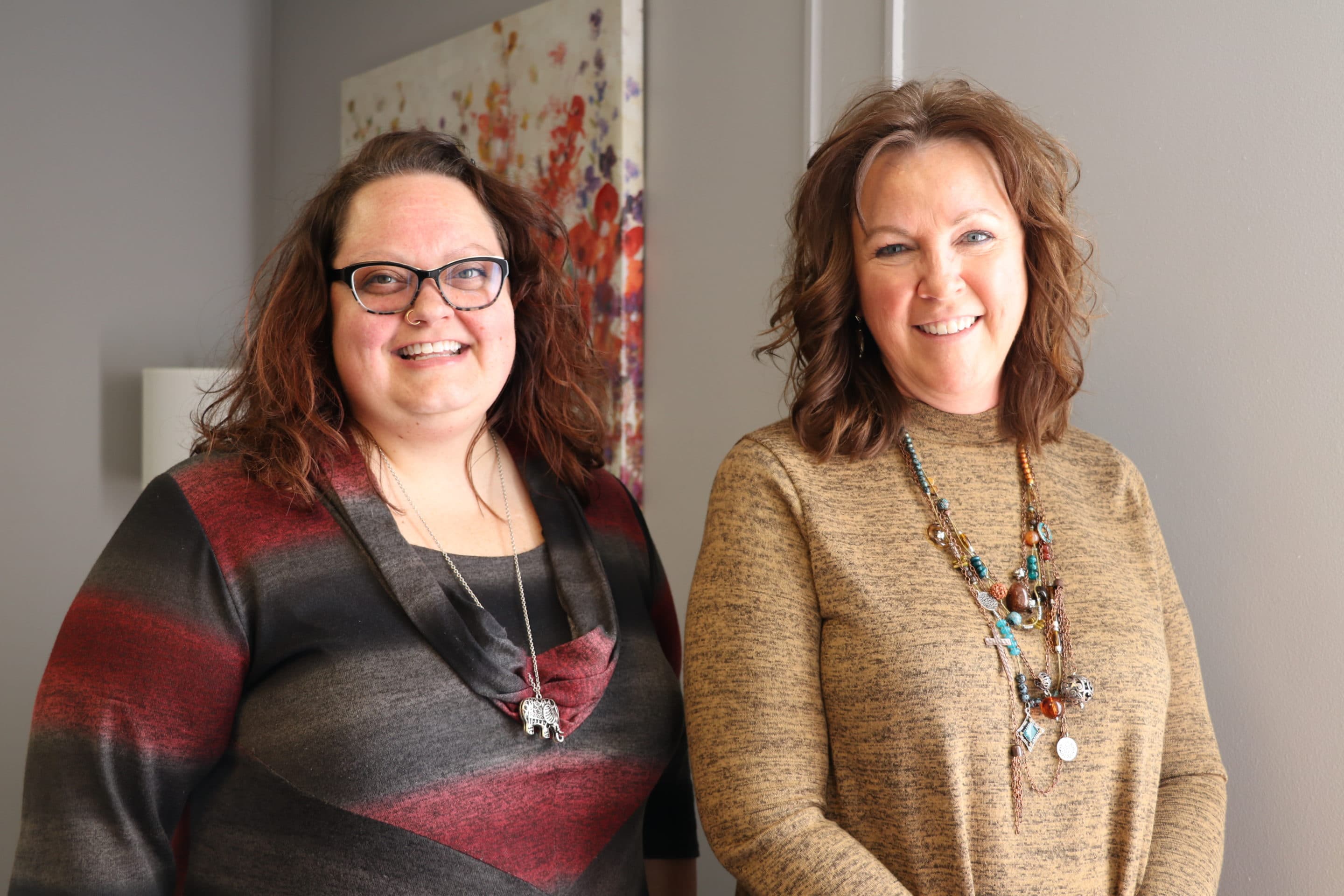
In this file photo from Jan. 9, 2019, Jennifer Francis-Gehring (left), of New Beginnings Sexual Assault Support Services in Owensboro, stands with Louanne Payne (right), of the Diocese of Owensboro. ELIZABETH WONG BARNSTEAD | WKC
‘Talking to someone, going outside and avoiding the news’
Self-care tips for survivors amid McCarrick trial headlines
BY ELIZABETH WONG BARNSTEAD, THE WESTERN KENTUCKY CATHOLIC
With former U.S. cardinal Theodore E. McCarrick back in national news as he faces criminal charges for the sexual assault of a minor, a local therapist and a pastoral assistance coordinator want survivors to know they are not alone.
Seeing or hearing about something that reminds a person of past trauma experiences “can cause us to relive those moments,” said Jennifer Francis-Gehring, a therapist with New Beginnings Sexual Assault Support Services, which is based in Owensboro.
This pain may be intensified due to the isolation and various challenges brought on by the COVID-19 pandemic, said Louanne Payne, the pastoral assistance coordinator (PAC) for the diocese, who is the person on the other end of the confidential phone line – available 24/7 – receiving any reports of sexual abuse at the hands of anyone serving the Church.
(This position is also known as the victim assistance coordinator, or VAC, in other dioceses and archdioceses.)
“Because of the pandemic, we are constantly being told it is not safe,” said Francis-Gehring. And “if I do not feel safe, I cannot learn; I cannot heal.”
Over the years, she and Payne have collaborated on several initiatives to support survivors of clerical sexual abuse. On Sept. 29, 2021, the two sat down with The Western Kentucky Catholic to discuss coping strategies for survivors and to offer the reminder that they are both available to listen to anybody’s story.
Cause and effects
In 2018, the Archdiocese of New York determined that an allegation that then-Cardinal McCarrick had abused a teenager in 1971 was “credible and substantiated,” leading to his dismissal from the clerical state in 2019. An investigation revealed that the high-ranking cleric had abused multiple children as well as seminarians.
McCarrick disappeared from public view for a time, only to return when news broke that he was facing three counts of sexually assaulting a teenager in Massachusetts in the 1970s. This case is the first time McCarrick has faced criminal charges for assault of a minor, due to statute of limitations laws in Massachusetts that permitted authorities to file charges.
Francis-Gehring explained that people may experience a variety of feelings when topics like this come up in the news.
“People might have difficulty sleeping, difficulty in regulating their emotions, difficulty with self-care,” she said. “There might also be people experiencing grief, shame and guilt of ‘I never spoke up.’”
Payne said grief may also be experienced by “people who aren’t survivors themselves, but who are grieving their Church,” or the “death” of the image of a Church leader who was discovered to have committed abuse.
Francis-Gehring said a grief may also be felt by “those who are not perpetrators, who are left to pick up the pieces and rebuild that trust to the extent that they can.”
Adding to that is the reality that thanks to the pandemic, society in general is feeling “more depressed, anxious, unsettled, nervous, heaviness, stress, and overwhelmed,” she said.
Ways to cope
Francis-Gehring highlighted a number of self-care options when triggering circumstances – like the pandemic, or trending news items about the topic of abuse – threaten to steal a person’s peace.
“Try to avoid the news as much as possible,” she said. “Try to limit your exposure to the news as best you can.”
She said it is helpful to “have someone you trust who you can talk with be it a beloved family member, a beloved friend, a beloved priest, a therapist…” but explained that it is important to know “who to share your story with. Not everyone has the right to hear your story and the capacity to hear your story.”
Some of Francis-Gehring’s other suggestions were “going out into nature and the sunshine, fresh air, nutritious food, talking to someone, physical movement, creating playlists of music that bring joy to yourself, adult coloring books and maybe even praying while coloring, saying prayers, playing an instrument…”
Francis-Gehring said coping skills that work for one person may not work for another, and that even Googling “coping skills” could help a person find what fits best.
“Or, if you even want to just go and sit in the quietness of a church,” she said, suggesting that a person could find out if their local parish keeps the church unlocked for quiet personal prayer during the daytime.
Francis-Gehring emphasized that even those who are not abuse survivors, but are the people who get to hear someone’s story – such as the loved one of a survivor – “must take care of themselves.”
“If we don’t, we too can start to have PTSD (post-traumatic stress disorder) symptoms,” she said. “We need to do the coping skills, too.”
A phone call away
Payne said she is glad the diocese has a live person available 24/7 to answer the phone number for reporting abuse allegations.
When a survivor feels that they are being heard, “it’s life-changing,” she said. Therefore, “the first thing you have to do is listen. You have to let them know they are being heard.”
New Beginnings also has a 24/7 hotline, “so that people can reach out anytime they need to,” said Francis-Gehring, adding that she has even been awakened by a call at 3 a.m.
“In working with survivors we want them to know that ‘you are hearing me and seeing me for who I am,’” she said.
Payne said it is encouraging “to know how the last five years have been handled (by the Church) better than the past 20 years.”
She said she appreciates how Bishop William F. Medley makes himself available to meet with people, citing his town hall meetings held across the diocese after the 2018 news broke about McCarrick. The diocese and New Beginnings have also worked together in previous years to offer group therapy and support groups for survivors.
“When we know better, we do better,” said Payne.
To report suspected abuse, call the Kentucky Child Protection Hot Line: 1-877-KYSAFE1 or 1-877-597- 2331 (Toll Free) or contact your local Commonwealth Attorney. To report abuse to the diocese, current or past, by anyone acting in the name of the Church, call Louanne Payne, Pastoral Assistance Coordinator (English) at 270-852- 8380, or Susan Montalvo-Gesser/ Miguel Quintanilla, Pastoral Assistance Coordinator (Spanish) at 270-880-8360. You may also visit the Office of Safe Environment (owensborodiocese.org/safe) for more information.
Resources
- CredibleMind: https://healthymind.crediblemind.com/
- National Sexual Assault Hotline: 1-800-656-4673, https://www.rainn.org/
- New Beginnings Sexual Assault Support Services: 1-800-226-7273, https://nbowensboro.org/
- National Suicide Hotline: 1-800-273-8255
- River Valley Behavioral Health Crisis Line/ Mobile Crisis Unit: 1-800-433-7291
Originally printed in the November 2021 issue of The Western Kentucky Catholic.

